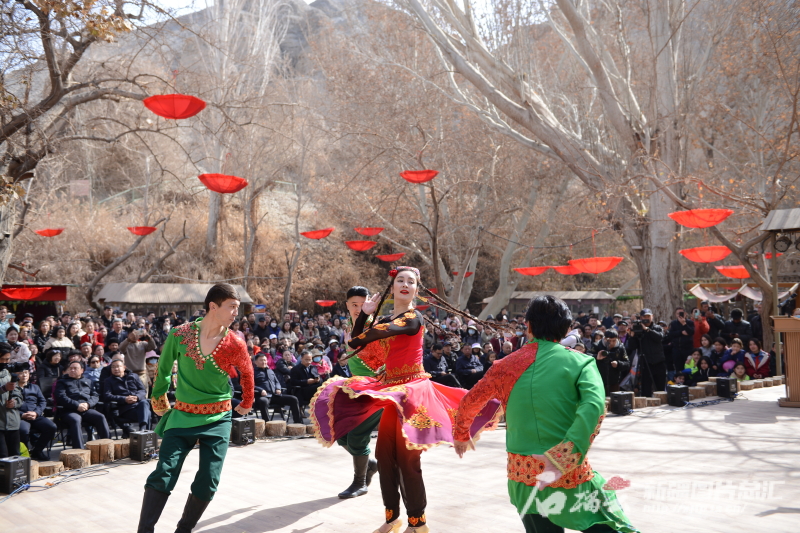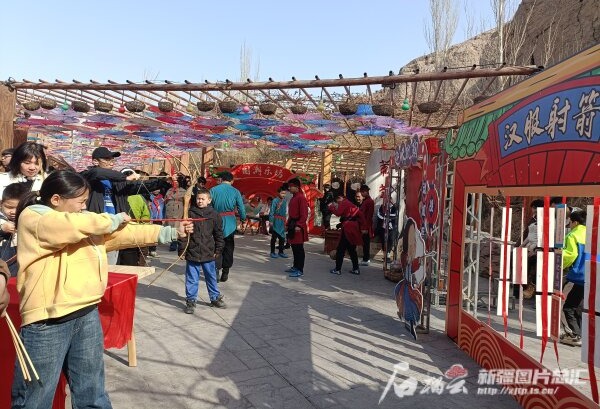Shiliuyun-Xinjiang Daily (Reporter Song Weiguo) news: In Turpan Prefecture, northwest China’s Xinjiang Uygur Autonomous Region, the apricot blossom season kicked off on March 20, 2024, ushering in the long-awaited "first spring of Xinjiang."
On March 9, 2024, at the Grape Valley scenic spot, the song The Girl of Karez Wells echoed through the air. As tourists listened, they couldn't help but tap their feet and dance to the happy melody. The warm sunshine made everyone's faces light up with happy smiles, and it was such a beautiful sight, like a stunning picture of spring coming to life. The girl mentioned in the song, Aygul, was simply gorgeous with her big eyes and long braids.
The People's Government of Turpan City organized the inaugural grape festival for digging out grapevines at the Grape Valley scenic spot. On the same day, Zhang Lin, a tourist from northwest China's Gansu Province, said, “I had searched on the internet before arriving and found out that Turpan is always the first place to carry out activities themed on 'first spring of Xinjiang' .”
Why is Turpan the first stop of the spring flower tour in Xinjiang? Follow us to find answers in the countryside and cities of Turpan.
Unique terrain fosters a warm climate
“Turpan's apricot blossoms can bloom when the average temperature remains five degrees Celsius for five consecutive days. This is why Turpan is always the first city in Xinjiang to welcome spring," said Ma Hong, the director of the Turpan Agrometeorological Experimental Station.

Photo taken On March 9, 2024 shows wonderful folk performances at the inaugural grape festival for digging out grapevines in Turpan City, northwest China’s Xinjiang Uygur Autonomous Region. (Photo by Osman Abdu)
Ma Hong explained that the Turpan Basin is an extremely arid and rainless area. According to meteorological data, the average annual precipitation in Turpan is only 16mm, while the evaporation rate is over 3000mm, and the annual sunshine duration exceeds 3,200 hours.
The Turpan Basin, which has an average elevation of around 500 meters, is a depression encircled by mountains. During spring, the peripheral airflow descends across the mountains, intensifying the warming effect. Due to its location, the heat accumulated in the Turpan Basin finds it tough to dissipate outward, leading to the creation of "the first spring in Xinjiang."
“Turpan's unique terrain and growing conditions allow the apricot to bloom earlier than it grows in other places,” said Ma Hong.
Known as "the first spring in Xinjiang," Turpan welcomes tourists to experience its unique charm every spring.
In spring, flowers begin to bloom from Turpan
Every year, around mid-March, ten thousand mu of apricot blossoms in Toksun County bloom in full glory, attracting many tourists. Girls wear Hanfu (a traditional Chinese clothing) and walk among the apricot blossoms, while photography enthusiasts set up their equipment to capture the beauty of spring. The blooming of apricot blossoms in Toksun marks the beginning of the flower season in Xinjiang.
During this colorful season, pink apricot blossoms, crimson peach blossoms, and snow-white pear blossoms compete with each other, spreading the breath of spring from Turpan and permeating every corner of Xinjiang.
Due to the fluctuating cold weather in early spring every year, the peak flower season may shift unpredictably. Nonetheless, this does not dampen the enthusiasm for spring of the people in Xinjiang. Various events are organized to welcome the arrival of spring and bid farewell to the long winter. People dress in spring attire, sing and dance in fields and scenic spots, and celebrate the promising spring season.
The song of spring breeds the hope of harvest
For most people, walking and enjoying the flowers in the warm spring sun is the preferred way to spend their time.
During this festival on March 9, 2024, many attendees, including primary and secondary school students, put off their heavy down jackets, sweaters and coats to enjoy the warm spring weather. Activities such as archery, Cuju (an ancient Chinese ball game), and playing guzheng (a classical Chinese zither) were arranged, with students participating enthusiastically.

Photo taken on March 9, 2024 shows tourists experience the fun of archery at inaugural grape festival for digging out grapevines in Turpan City, northwest Chian’s Xinjiang Uygur Autonomous Region. (Photo by Shiliuyun-Xinjiang Daily /Song Weiguo)
"The weather is warm, our family takes the opportunity to go for a walk.” On the same day, Zhao Yue, a local of Turpan, took his mother and eight-year-old child to the Grape Valley to take pictures, and try various delicacies made by local merchants.
Currently, citizens are enjoying themselves by going on outings, while fruit growers are eagerly looking forward to a bountiful harvest this season. In the Grape Community located on Grape Valley Street in Gaochang District, Turpan City, Elyar Rozi and his family are busy digging out grapevines from the ground.
Turpan has a long history of grape cultivation. In order to protect the vines from the harsh winter, fruit growers bury them deep in the ground every year before the winter sets in. For small vineyards, the vines are gathered together and wound into cakes before being buried in the ground, forming small mounds. When the weather warms up, the vines are then dug out from the ground, which is called "Kaidun." On the other hand, for larger vineyards, the vines are buried in ditches. “It is easier for mechanized and efficient digging. This method also helps with fertilization and other farming operations during spring,” explained Elyar.
Every year, fruit growers eagerly anticipate the farming of grapes. To them, vines climbing up the grape trellis signal the start of a busy farming season and the promise of a bountiful harvest.
(A written permission shall be obtained for reprinting, excerpting, copying and mirroring of the contents published on this website. Unauthorized aforementioned act shall be deemed an infringement, of which the actor shall be held accountable under the law.)









